I want to like this show, you guys. I really do.
The latest installment of Discovery does feel the most like an episode of Trek of any thus far; specifically, it feels like a two-part Voyager from 1999 called “Equinox” where they wrestled with pretty much the exact same issue that the crew of Discovery does here: torturing animals makes our ship go really fast, should we do it?
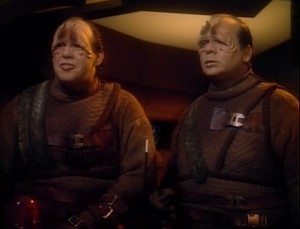
We look for things. Things that make us go. Things like space-bears.
It is a Trek-worthy thought experiment but besides the fact that it’s been done before (God knows Trek is not above going back to its own gravity well for story ideas), what made the story compelling in Voyager (and we’re talking about Voyager here, a very uneven show that never really lived up to its potential) was this: the USS Voyager was stranded 75,000 light years from home, and its captain believed that the best way to get back to Earth was by continuing to adhere to the principles that made Starfleet, and the Federation at large, the force of peace and progress that it held itself to be. Refusing to compromise on Starfleet ideals was what got the ship lost in space in the first place.
But then they discover that another Federation ship has also been stranded out there, the Equinox, except that ship’s captain has decided to eschew all of Starfleet’s high-minded ideals in favour of getting back to Earth as fast and efficiently as possible, no matter what the moral cost. And it was working.
There’s a conflict between two crews with the same goal but opposing philosophies, the internal struggle of Voyager’s crew – some of whom think that Captain Ransom of the Equinox may be on the right track – and of Captain Janeway herself, who certainly has not been consistent in applying Starfleet ideals in circumstances beyond the context in which they had been formulated.
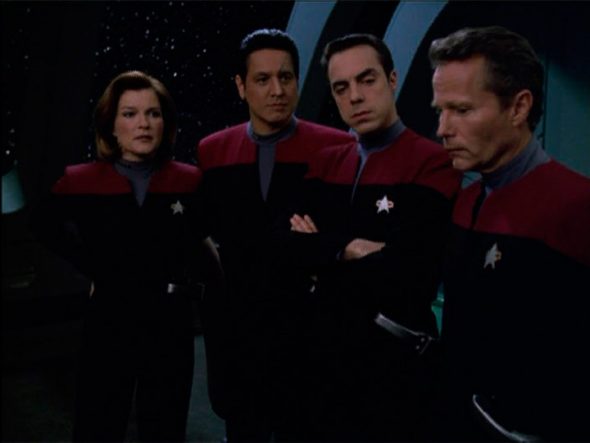
In Discovery, the same basic idea – can the ends justify the means? Is torturing an innocent justifiable if it helps us win this war? (Territory also trod by Enterprise, incidentally) – falls relatively flat.
And here’s why: I don’t really believe that any of these characters have any ideals, and neither does the Starfleet that we’ve been shown up to this point. We already know from previous series that the Federation’s bright and shiny exterior has a certain seedy underbelly it’s reluctant to admit to, and that the nice, safe Federation can have difficulty relating to the problems of worlds with radically different cultural and socioeconomic situations than its own. Which is maybe why Discovery hasn’t felt the need to introduce Starfleet as the kind of organization that engenders a sense of duty. It assumes that we’ll take that for granted.
But we can’t. Because what we’ve actually been shown is mostly a bunch of senselessly angry people who display no respect for their fellow officers (even between the dudes who are supposedly in a romantic relationship) or the chain of command – despite the fact that Burnham is supposedly the first mutineer in Starfleet history, practically every conversation we’ve seen between officers of different ranks has been full of what I can only call borderline-at-best-insubordination; what we’ve been shown in a Starfleet that holds secret trials and treats its prisoners like garbage; a Starfleet that, sure, didn’t want to fire first at the Klingons but which had no problems hurting an animal if it’ll let them get to Romulus in a hurry (don’t even get me started on Romulus).
This wasn’t a rogue ship like the Equinox or one particularly ruthless captain like Pressman of the Pegasus in the Next Gen episode of the same name (who ended up court martialed for his part in violating the Treaty of Algernon by experimenting with a prototype for an illegal Federation cloaking device).
This is just plain old Starfleet Command. Sanctioning this. Literally the only person who’s bothered by it at first is Burnham. Nobody else gives a crap.
(Oh, and speaking of swearsies, I’ll bet the writers of Discovery are feeling pretty proud of themselves for getting to launch the first f-torpedo in Star Trek history. So edgy. All I have to say about that is: Double dumbass on you.)
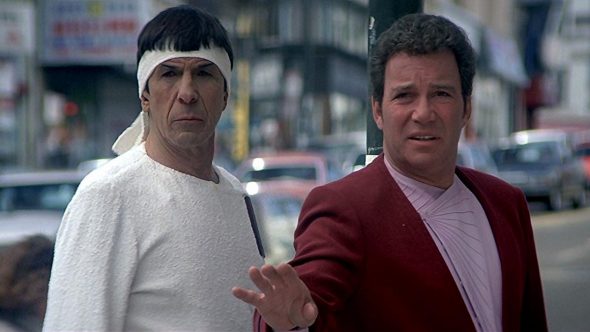
Anyway. By the time we meet Lieutenant Tyler on the Klingon prison ship, who shares his food with Captain Lorca because of his duty to defer to a senior officer, I was genuinely surprised; this was the first time anyone has shown any Starfleet-like behavior on the show at all.
Even the intended moments of humour – mostly centered around Cadet Tilly – totally fail to be amusing because the whole tone of the show is wrong. Star Trek has been known to go from light to dark and back again, absolutely (hell on Lorca’s eyes, I’m sure). But in Discovery, the show’s atmosphere is so tense and joyless it completely deflates the possibility of levity, so Tilly’s awkwardness is never funny, it’s just weird. She’s no Reg Barclay, that’s for sure.
Look, I will admit that Discovery is getting better every episode. There is some interesting stuff going on: the parallels between Discovery being the only ship with a spore drive and the unique Klingon cloaking ship (we’ll learn about the deal with the Romulans shortly, I’m sure); the spore drive itself, which, now that it’s finally been elaborated upon (the engine takes advantage of a conveniently universe-spanning megaorganism that exists partly inside ordinary space and partly in subspace) is perfectly Trekkish in its absurdity; and the always great Rainn Wilson as Harry Mudd (portrayed in the Original Series by Roger C. Carmel) making the best of a bad situation in more ways than one.
Also: is it just me, or did Lorca imply that Klingons have two dicks? I thought the four nostrils was a radical design choice.
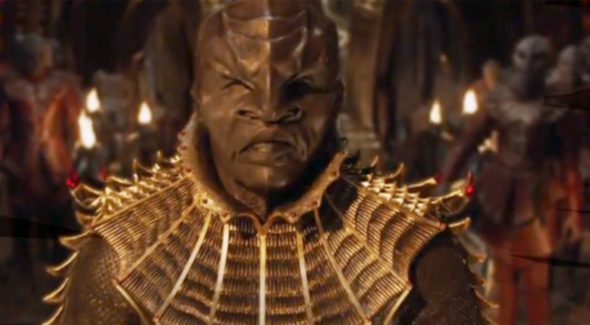
Tl;dr – the real new Star Trek series is Duck Tales. Deal with it.
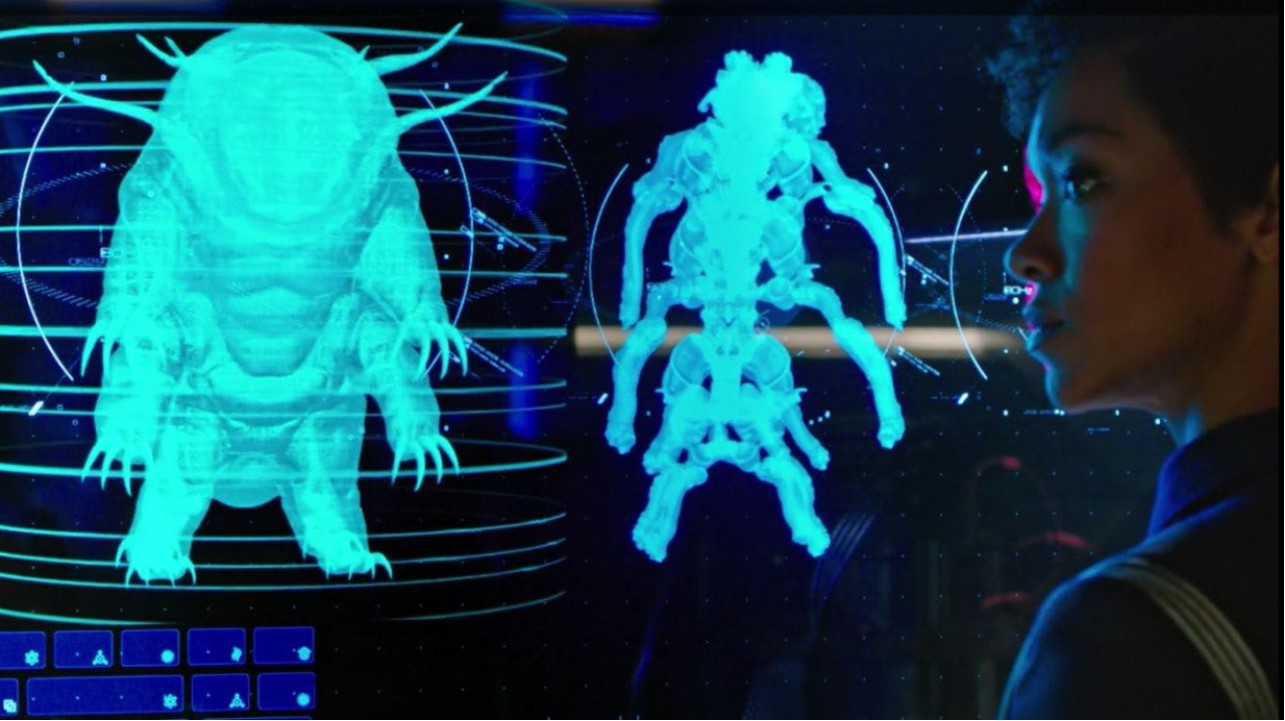
You’re hitting some of the main points that irritate me most about this show so far and that I don’t really see mentioned that much. After the first two shows I couldn’t believe Burnham was an officer with all the insubordination and screw ups and the idea that a Starfleet ship (at war!) with a hardass captain would tolerate so much backtalk seems odd. I was thinking this as I was flipping by some TNG and it had a scene where Ensign Ro muttered something about a Romulan aid mission being a mistake and Riker shut that down right away with a what was that ensign? .
It’s like in Apollo 18, the actual astronauts commented that the scenes where they’re fighting and blaming each other didn’t actually happen. They were not going to have a fistfight up there and Ron Howard conceded that they added that because Drama! Tension!
I’ve heard for so many years that the Star Trek shows were hindering good stories and drama because conflict between characters was downplayed or nonexistent and I guess Discovery is the natural outgrowth of that.
Everything is of it’s time though and I feel this star trek fits far more easily within the Battlestar Galactica world than the old Star Trek one.
I was suprised they almost went full Equinox with that creature (only almost killing it) but was disturbed that Starfleet wanted to round up more of these creatures. I shudder to think what they would do with Data if he was unfortunately created in this world. Yep, can’t wait for their measure of a man episode.
And Cadet Tilly threw me as well but I didn’t realize why until you mentioned the weird contrast in tone – that’s exactly it. It’s like she wandered in from the Orville set.
There’s bits to like but I don’t think I’ll ever really get into it if it keeps up with the same kind of attitude. I think I read that it may be showing the evolution of people/Starfleet into the more noble version from the earlier series but although interesting that wouldn’t redeem it for me. It would be like doing a Superman show where the entirety of it was him being an amoral ass but at the end he becomes the popular hero. Sigh – I wish people would stop overcomplicating and ruining my fun little genre entertainments.
I want to go off of your point about Star Trek’s stories being hindered by the no conflict rule. I’ve also heard it for years, and always as an article of common knowledge that it made the shows worse. But I never quite believed it. And Discovery, to me, seems to show that it might have actually helped make the franchises what they were.
Because while on TNG the characters didn’t have interpersonal conflicts, they did have disagreements. And the disagreements were often about big ideas, about morality, about what “doing the right thing,” meant, and things like that. Discovery, this episode especially, shows that if you have arguments between crew members who are constantly sniping at each other, every argument seems petty. On TNG, the audience would have known that any insubordination, like the kind Burnham and Stamets’s doctor boyfriend show, would have been borne out of principle, out of the belief that it must be done. On this show, it’s hard to know how much is principle and how much is how they feel about Saru or Lorca, their past, Starfleet, their mission, orwhatever. To take a conversation that’s not as discussed in this article, we can look to Stamets and The Doctor (whose name I don’t remember) in their brushing their teeth scene. Here’s two people who are serving together on a ship while in a romantic relationship committed enough that they are living together. In no Star Trek show would we get a scene where we’re convinced these two people are actually a couple. But, we would get a conversation about what it means to serve as a soldier with someone you love. About the responsibilities to the crew and organization, versus the responsibilities to your partner/boyfriend/husband/whatever they are. (Honestly, I thought they were married because of how bickery they were with each other, but given how bickery everyone is with everyone on this ship, who knows). And these ideas are skirted around in the conversation that they do have, but only skirted around. Instead these two talk about their feeling, and keep talking about their feelings. Maybe this was an attempt to make them believe them as a couple, but it doesn’t work. So we lose out on the Star Trek-ness for an ineffectual attempt at being a drama bout feelings. And don’t get me wrong, dramas about feeling can be great. But that’s not what I watch Star Trek for. If I want to watch a show about married couples talking about their feelings I’ll just watch Parenthood or This Is Us, because those shows know how to make good drama around feelings. Star Trek is a show about putting people in ridiculously unlikely situations and have discussions about technobabble until they have to make high stakes decisions based on their interpretations of certain universal principles. Discovery, by introducing feelings into this equation basically undermines the whole enterprise.
I’ve been trying not to wade too much into the criticisms of this show because history has a way of playing out just the same again and again for Trek and the early negative fan reactions are usually on the wrong side of hindsight. Besides that, a good portion of both the Original Series and TNG are basically unwatchable at this point, especially the early episodes (what other series are you willing to suggest to people while also saying “oh, except that the first two seasons of this seven-season show [nearly thirty percent of the whole!] are mostly terrible”), so there are always some growing pains. Plus, we’re only five episodes in on Discovery and we’re not necessarily committed to one vision of this show. Fuller has already left and CBS has decisions to make based on how well this thing is marketing their All-Access service right now.
But I also understand that CBS didn’t pitch this to compete with the Flashes and the Arrows and the Agents of Shields of the broadcast world. Trek was only classy back when TV was trashy, sure, but there’s still a place for the exact same style of dilemma-of-the-week adventure serial today and there are definitely adults, sophisticated ones even!, watching these kinds of shows. They could have played by that same old rule book and maybe even done undeservedly well for themselves just by trading in on some limp nostalgia points (see: Star Wars) but instead they took a chance and tried to fit Star Trek into a post-HBO mold and I think that a lot of the resentment boiling up is tied to this approach.
In other words, it’s not that the show is bad Star Trek. That’s probably still true but it’s at least forgivable. It’s that the show is bad Daredevil.
When you sit down to watch Netflix you expect that your story has been planned out in advance and has a consistency of tone and messaging that will carry you through even a few rough patches. So far Discovery has had at least three premiere episodes and is gearing up for a fourth:
1) The Shenzhou debacle
2) Burnham integrating with the Discovery crew which took an hour and is now done, I guess. She doesn’t even get any strange looks in the hallways anymore.
3) Oh, we’re doing tardigrades now? Okay, so this is a show about scientific experimentation and the morals of —
4) Oh, nevermind. We’re done with that and on to something else maybe. Great.
(Side note: apparently the tardigrade was originally going to stick around and morph into something humanoid and become part of the crew. They scrapped that when the effects became too costly. Considering they were far enough along to start doing tests the scripts for this section of the show may have had to undergo radical last-minute changes. That also feels like it was probably meant to be one of their biggest Trek moments; tolerance and diversity and such.)
This all feels a lot closer to classic Trek, actually. DS9 spent at least half a season trying to be less about adventure and more about politics but felt fully formed by the time the school bombing episode happened. TNG had an impressive amount of world-building set up right off the bat but took forever to figure out how to tell good stories with it. The Original Series didn’t even know what the Federation was or the Prime Directive or its own humanist philosophy when it started.
Personally, I’m willing to keep giving this show a chance because it’s not like I’m watching a lot of television anyways and Star Trek is something I prefer most whenever it’s trying new things. Also, I have a whole sunk-cost fallacy thing going on because of four seasons of Enterprise.
Here’s hoping that Discovery plays out more like DS9 and less like Scott Bakula waiting around to be cast on a CSI show.
With the exception of Locra(a kick ass hard as captain)I can’t stand anything at all about this show. The mushroom drive is beyond stupid! The Klingons look like crap! The only good thing other than Locra was looking at the beautiful redhead Emily Coutts playing Keyla….until she got her cybernetic eye thing!
a neat little bit of trivia: paul stamets is actually a relatively famous real life mycologist. i say relatively because i suppose he’s about as famous as a mycologist can be. heh. a little late, but was scrolling through the articles and thought i’d drop a useless bit of trivia here. ^_^